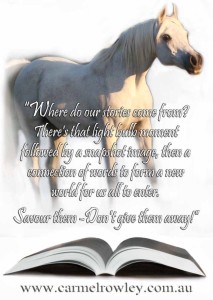Where is my copy of ? That’s right I leant it …
I do not lend books. No I’ll start that again. I no longer lend books. I found some fabulous words from a blog by Roger Rosenblatt right at a time when I had a book returned to me in the most deplorable condition. You might say, at least it was returned and I guess that’s true BUT the poor thing was at deaths door, pages falling out, spine broken, the cover creased and the final straw – missing pages. So I made a difficult decision to euthanize it.
So what do you do when someone asks to borrow a book? These days I work hard at not immediately snapping out NO! But if I relent, I have to know the person will offer my book the kind of home I do because there’s a good chance I’ll never see my book again.
The next question sneaking into my mind is … Can I Iive without this book?
Most of the books I keep, I love, so to live without most of the books in my bookcase is unfathomable and for some reason people never want to borrow the books I don’t like.
One thing I’ve noticed about books, especially if you frequent second hand stores is the books that are shabby and look well read are usually A GREAT READ! The pristine book is usually not so great. Mind you I have read books and purposely not creased the spine and I’m not one to fold over pages of any favourite book. I have dozens of bookmarks and lots of reference books with labelled pieces of paper sticking out the top marking the pages I need to refer back to.
Roger Rosenblatt on lending books:
http://jeaninallhonesty.blogspot.com.au/2009/11/roger-rosenblatt-on-borrowing-books.html
My dear friend Jenny sent me this quote from a book she was reading. I laughed.
The custom of borrowing books confutes nature. In every other such situation, the borrower becomes a slave to the lender, the social weight of the debt so altering the balance of a relationship that a temporary acquisition turns into a permanent loss. This is certainly true of money. Yet it is not at all true with books. For some reason a book borrower feels that a book, once taken, is his own. This removes both memory and guilt from the transaction. Making matters worse, the lender believes it too. To keep up appearances, he may solemnly extract an oath that the book be brought back as soon as possible; the borrower answering with the matching solemnity that the Lord seize his eyes were he to do otherwise. But it is all play. Once gone, the book is gone forever. The lender, fearing rudeness, never asks for it again. The borrower never stoops to raise the subject…
There’s no spectacle that is so terrifying as the sight of a guest in your house whom you catch staring at your books. It is not the judgmental possibility that is frightening. the fact that one’s sense of discrimination is exposed by his books. Indeed, most people would much prefer to see the guest first scan, then peer and turn away in boredom or disapproval. Alas, too often the eyes, dark with calculation, shift from title to title as from floozie to floozie in an overheated dance hall. Nor is that the worst. It is when those eyes stop moving that the heart, too, stops.
The guest body twitches; his hand floats up to where his eyes have led it. There is nothing to be done. You freeze. He smiles. You hear the question even as it forms:
“Would you mind if I borrowed this book?”
“Mind? Why should I mind?”
The fact that I came upon that book in a Paris bookstall in April 1969 – the thirteenth, I believe it was, the afternoon, it was drizzling – that I found it after searching all Europe and North America for a copy; that it is dog-eared at passages that mean more to my life than my heartbeat; that the mere touch of its pages recalls to me in a Proustian shower my first love, my best dreams.
Should I mind that you seek to take all that away? That I will undoubtedly never get it back? Then even if you actually return it to me one day, I will be wizened, you cavalier, and the book spoiled utterly by your mishandling?
“Mind? Not at all. Hope you enjoy it.”
“Thanks. I’ll bring it back next week.”
“No rush. Take your time.” [Liar.] from a monologue by Roger Rosenblatt, quote in Harold Rabinowitz “A Passion for Books.”

Leave a Reply